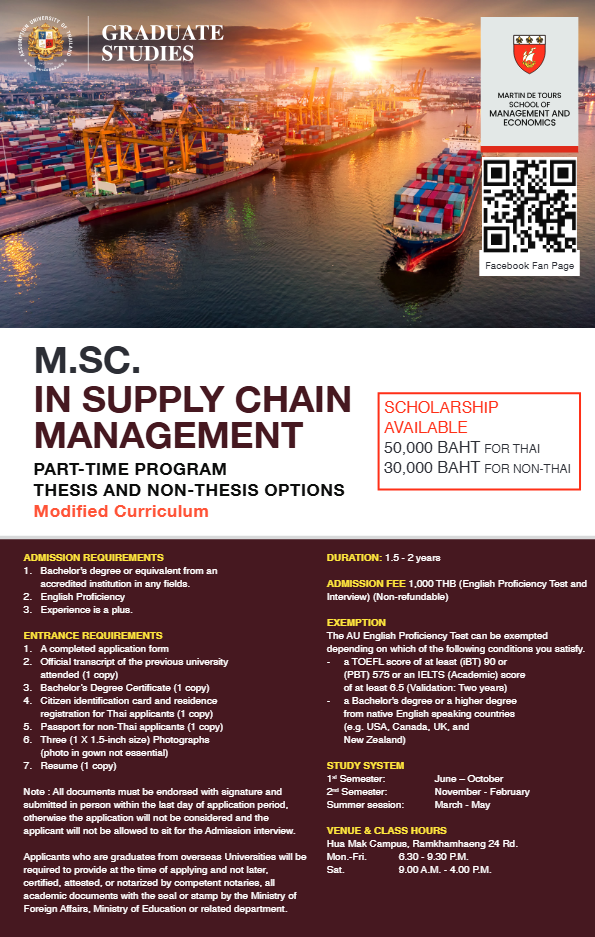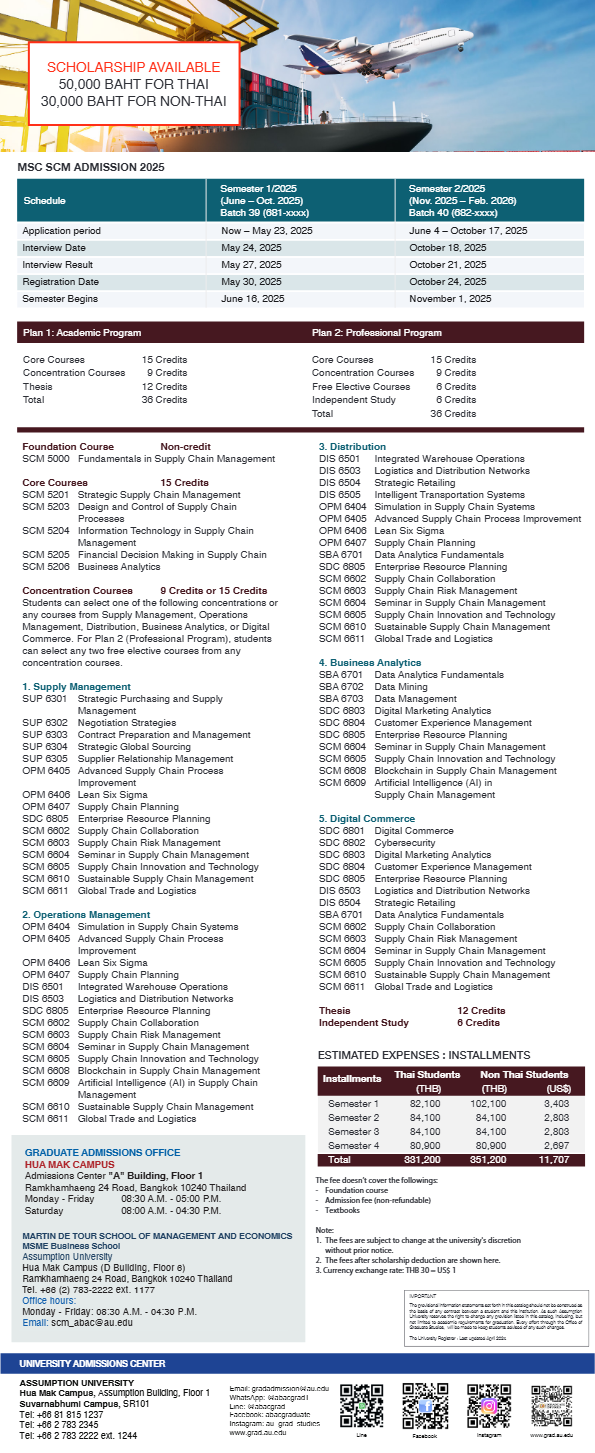
M.SC. In Supply Chain Management
Part-Time Program (1.5-2 Years)
Thesis and Non-Thesis Options
- Master of Science Program in Supply Chain Management – M.Sc. (SCM)
- คณะบริหารธุรกิจ หลักสูตรวิทยาศาสตรมหาบัณฑิต สาขาวิชาการจัดการโซ่อุปทาน
Program Director:
Asst. Prof. Dr. Piyawan Puttibarncharoensri
Program Description:
The philosophy of the Master of Science Program in Supply Chain Management is to recognize the increasing pace of change and prepare students for a world beyond our imagining, beyond precise predictions, beyond precise definition. We have to prepare students for exponential change, without knowing exactly what such change will be.
Some can be emerging, such as the increasing speed and complexity of change, the rise of the East and the dominance of China and India, market and economic volatility, increased cost and scarcity of raw materials and energy, goods and logistics and inflation generally, increased use of technology by customers, changing nature of society and demography, awareness and action on sustainability, and concern about product safety. These changes in the next ten years will be greater than in the whole of the previous fifty years.
There will also be new business models, with more hybrid forms, often due to increasing collaboration between firms who need to share crucial information with their partners across the supply chain. All these changes demand increased skills and knowledge in the workforce, and especially in its professional elites who will have the responsibility of facing these challenges head-on and mapping ways through them to success.
Therefore, the Master of Science Program in Supply Chain Management aims to equip students with transferable adaptable skills which can be relevant to many situations and contexts. These include the skills of understanding changes and happenings through mental skills of assimilation of facts and trends, identification and analysis of components, assembling a cognitive mind map of the terrain, and deciding action, control, and leadership. Agility and flexibility are essential. These skills will evolve from a case-study methodology and interactions with leading-edge practitioners in a variety of businesses, brand-names and SMEs. As important is the integrity and moral standards of our students. For a sustainable, fair, and human future, graduates of sincerity, honesty, and goodwill are needed.
Admission Requirements
- Bachelor’s degree or equivalent from an accredited institution in any fields.
- English Proficiency
- Experience is a plus.
Entrance Requirements
- A completed application form
- Official transcript of the previous university attended (3 copies)
- Bachelor’s Degree Certificate (3 copies)
- Citizen identification card and residence registration – for Thai applicants (3 copies)
- Passport – for non-Thai applicants (3 copies)
- Four (1 X 1.5-inch size) Photographs (photo in gown not essential)
- Resume (3 copies)
Exemption
The AU English Proficiency Test can be exempted depending on which of the following conditions you satisfy.
- a TOEFL score of at least (iBT) 90 or (PBT) 575 or an IELTS (Academic) score of at least 6.5 (Validation: Two years)
- a Bachelor’s degree or a higher degree from native English speaking countries (e.g. USA, Canada, UK, and New Zealand)
Number of credits 36 Credits
Curriculum Structure
| Core Courses | 15 Credits | |
| Concentration Courses | 9 Credits | |
| Thesis | 12 Credits | |
| Total | 36 Credits |
Project or Research Requirements
- Students who choose Thesis Option (Plan A Type A 2) have to do research. Students must propose a topic or study area (Proposal defense) to the Thesis Examination Committee and take the final oral examination (Thesis defense) after the completion of their research. After all the corrections and revisions have been made, students must publicize part of their research studies in journals or academic publications or present their work in conferences with proceedings and submit the full theses to the university.
| Core Courses | 15 Credits | |
|
Concentration Courses
Free Elective Courses |
9 Credits
6 Credits |
|
| Independent Study | 6 Credits | |
| Total | 36 Credits |
.
Project or Research Requirements
- Students who choose Non-Thesis (Plan B) have to take a course on Independent Study. Students must propose a topic or study area (Proposal defense) to the Project Examination Committee and take the final oral examination (Project defense) after the completion of their research. After all the corrections and revisions have been made, students must submit the full project to the university.
Foundation Course Non-credit
| SCM 5000 | Fundamentals in Supply Chain Management | Non-credit |
Core Courses 15 Credits
| SCM 5201 | Strategic Supply Chain Management | 3 (3-0-6) |
| SCM 5203 | Design and Control of Supply Chain Processes | 3 (3-0-6) |
| SCM 5204 | Information Technology in Supply Chain Management | 3 (2-2-5) |
| SCM 5205 | Financial Decision Making in Supply Chain | 3 (3-0-6) |
| SCM 5206 | Business Analytics | 3 (2-2-5) |
| Concentration Courses 9 Credits | ||
| Students can select one of the following concentrations from Supply Management, Operations Management, Distribution, Business Analytics, or Digital Commerce and select 3 courses for a total of 9 credits | ||
| 1. Supply Management | ||
| SUP 6301 | Strategic Purchasing and Supply Management | 3 (3-0-6) |
| SUP 6302 | Negotiation Strategies | 3 (3-0-6) |
| SUP 6303 | Contract Preparation and Management | 3 (3-0-6) |
| SUP 6304 | Strategic Global Sourcing | 3 (3-0-6) |
| SUP 6305 | Supplier Relationship Management | 3 (3-0-6) |
| OPM 6405 | Advanced Supply Chain Process Improvement | 3 (3-0-6) |
| OPM 6406 | Lean Six Sigma | 3 (3-0-6) |
| OPM 6407 | Supply Chain Planning | 3 (3-0-6) |
| SDC 6805 | Enterprise Resource Planning | 3 (2-2-5) |
| SCM 6602 | Supply Chain Collaboration | 3 (3-0-6) |
| SCM 6603 | Supply Chain Risk Management | 3 (3-0-6) |
| SCM 6604 | Seminar in Supply Chain Management | 3 (3-0-6) |
| SCM 6605 | Supply Chain Innovation and Technology | 3 (2-2-5) |
| 2. Operations Management | ||
| OPM 6404 | Simulation in Supply Chain Systems | 3 (2-2-5) |
| OPM 6405 | Advanced Supply Chain Process Improvement | 3 (3-0-6) |
| OPM 6406 | Lean Six Sigma | 3 (3-0-6) |
| OPM 6407 | Supply Chain Planning | 3 (3-0-6) |
| DIS 6501 | Integrated Warehouse Operations | 3 (3-0-6) |
| DIS 6503 | Logistics and Distribution Networks | 3 (3-0-6) |
| SDC 6805 | Enterprise Resource Planning | 3 (2-2-5) |
| SCM 6602 | Supply Chain Collaboration | 3 (3-0-6) |
| SCM 6603 | Supply Chain Risk Management | 3 (3-0-6) |
| SCM 6604 | Seminar in Supply Chain Management | 3 (3-0-6) |
| SCM 6605 | Supply Chain Innovation and Technology | 3 (2-2-5) |
| SCM 6606 | Blockchain | 3 (2-2-5) |
| SCM 6607 | Artificial Intelligence (AI) | 3 (2-2-5) |
| 3. Distribution | ||
| DIS 6501 | Integrated Warehouse Operations | 3 (3-0-6) |
| DIS 6502 | Multimodal Transportation Systems | 3 (3-0-6) |
| DIS 6503 | Logistics and Distribution Networks | 3 (3-0-6) |
| DIS 6504 | Strategic Retailing | 3 (3-0-6) |
| OPM 6404 | Simulation in Supply Chain Systems | 3 (2-2-5) |
| OPM 6405 | Advanced Supply Chain Process Improvement | 3 (3-0-6) |
| OPM 6406 | Lean Six Sigma | 3 (3-0-6) |
| OPM 6407 | Supply Chain Planning | 3 (3-0-6) |
| SBA 6701 | Data Analytics Fundamentals | 3 (2-2-5) |
| SDC 6805 | Enterprise Resource Planning | 3 (2-2-5) |
| SCM 6602 | Supply Chain Collaboration | 3 (3-0-6) |
| SCM 6603 | Supply Chain Risk Management | 3 (3-0-6) |
| SCM 6604 | Seminar in Supply Chain Management | 3 (3-0-6) |
| SCM 6605 | Supply Chain Innovation and Technology | 3 (2-2-5) |
| 4. Business Analytics | ||
| SBA 6701 | Data Analytics Fundamentals | 3 (2-2-5) |
| SBA 6702 | Data Mining | 3 (2-2-5) |
| SBA 6703 | Data Management | 3 (2-2-5) |
| SDC 6803 | Digital Marketing Analytics | 3 (2-2-5) |
| SDC 6804 | Customer Experience Management | 3 (2-2-5) |
| SDC 6805 | Enterprise Resource Planning | 3 (2-2-5) |
| SCM 6604 | Seminar in Supply Chain Management | 3 (3-0-6) |
| SCM 6605 | Supply Chain Innovation and Technology | 3 (2-2-5) |
| SCM 6606 | Blockchain | 3 (2-2-5) |
| SCM 6607 | Artificial Intelligence (AI) | 3 (2-2-5) |
| 5. Digital Commerce | ||
| SDC 6801 | Digital Commerce | 3 (2-2-5) |
| SDC 6802 | Cybersecurity | 3 (2-2-5) |
| SDC 6803 | Digital Marketing Analytics | 3 (2-2-5) |
| SDC 6804 | Customer Experience Management | 3 (2-2-5) |
| SDC 6805 | Enterprise Resource Planning | 3 (2-2-5) |
| DIS 6503 | Logistics and Distribution Networks | 3 (3-0-6) |
| DIS 6504 | Strategic Retailing | 3 (3-0-6) |
| SBA 6701 | Data Analytics Fundamentals | 3 (2-2-5) |
| SCM 6602 | Supply Chain Collaboration | 3 (3-0-6) |
| SCM 6603 | Supply Chain Risk Management | 3 (3-0-6) |
| SCM 6604 | Seminar in Supply Chain Management | 3 (3-0-6) |
| SCM 6605 | Supply Chain Innovation and Technology | 3 (2-2-5) |
| Thesis 12 Credits | |||
| SCM 7201 | Thesis I | 3 (0-0-9) | |
| SCM 7202 | Thesis II | 9 (0-0-27) | |
Foundation Course Non-credit
| SCM 5000 | Fundamentals in Supply Chain Management | Non-credit |
Core Courses 15 Credits
| SCM 5201 | Strategic Supply Chain Management | 3 (3-0-6) |
| SCM 5203 | Design and Control of Supply Chain Processes | 3 (3-0-6) |
| SCM 5204 | Information Technology in Supply Chain Management | 3 (2-2-5) |
| SCM 5205 | Financial Decision Making in Supply Chain | 3 (3-0-6) |
| SCM 5206 | Business Analytics | 3 (2-2-5) |
| Concentration Courses 15 Credits | |||
| Students can select one of the following concentrations or any courses from Supply Management, Operations Management, Distribution, Business Analytics, or Digital Commerce. For Plan B (Coursework and Independent Study), students can select any two free elective courses from any concentration courses. | |||
| 1. Supply Management | |||
| SUP 6301 | Strategic Purchasing and Supply Management | 3 (3-0-6) | |
| SUP 6302 | Negotiation Strategies | 3 (3-0-6) | |
| SUP 6303 | Contract Preparation and Management | 3 (3-0-6) | |
| SUP 6304 | Strategic Global Sourcing | 3 (3-0-6) | |
| SUP 6305 | Supplier Relationship Management | 3 (3-0-6) | |
| OPM 6405 | Advanced Supply Chain Process Improvement | 3 (3-0-6) | |
| OPM 6406 | Lean Six Sigma | 3 (3-0-6) | |
| OPM 6407 | Supply Chain Planning | 3 (3-0-6) | |
| SDC 6805 | Enterprise Resource Planning | 3 (2-2-5) | |
| SCM 6602 | Supply Chain Collaboration | 3 (3-0-6) | |
| SCM 6603 | Supply Chain Risk Management | 3 (3-0-6) | |
| SCM 6604 | Seminar in Supply Chain Management | 3 (3-0-6) | |
| SCM 6605 | Supply Chain Innovation and Technology | 3 (2-2-5) | |
| 2. Operations Management | |||
| OPM 6404 | Simulation in Supply Chain Systems | 3 (2-2-5) | |
| OPM 6405 | Advanced Supply Chain Process Improvement | 3 (3-0-6) | |
| OPM 6406 | Lean Six Sigma | 3 (3-0-6) | |
| OPM 6407 | Supply Chain Planning | 3 (3-0-6) | |
| DIS 6501 | Integrated Warehouse Operations | 3 (3-0-6) | |
| DIS 6503 | Logistics and Distribution Networks | 3 (3-0-6) | |
| SDC 6805 | Enterprise Resource Planning | 3 (2-2-5) | |
| SCM 6602 | Supply Chain Collaboration | 3 (3-0-6) | |
| SCM 6603 | Supply Chain Risk Management | 3 (3-0-6) | |
| SCM 6604 | Seminar in Supply Chain Management | 3 (3-0-6) | |
| SCM 6605 | Supply Chain Innovation and Technology | 3 (2-2-5) | |
| SCM 6606 | Blockchain | 3 (2-2-5) | |
| SCM 6607 | Artificial Intelligence (AI) | 3 (2-2-5) | |
| 3. Distribution | |||
| DIS 6501 | Integrated Warehouse Operations | 3 (3-0-6) | |
| DIS 6502 | Multimodal Transportation Systems | 3 (3-0-6) | |
| DIS 6503 | Logistics and Distribution Networks | 3 (3-0-6) | |
| DIS 6504 | Strategic Retailing | 3 (3-0-6) | |
| OPM 6404 | Simulation in Supply Chain Systems | 3 (2-2-5) | |
| OPM 6405 | Advanced Supply Chain Process Improvement | 3 (3-0-6) | |
| OPM 6406 | Lean Six Sigma | 3 (3-0-6) | |
| OPM 6407 | Supply Chain Planning | 3 (3-0-6) | |
| SBA 6701 | Data Analytics Fundamentals | 3 (2-2-5) | |
| SDC 6805 | Enterprise Resource Planning | 3 (2-2-5) | |
| SCM 6602 | Supply Chain Collaboration | 3 (3-0-6) | |
| SCM 6603 | Supply Chain Risk Management | 3 (3-0-6) | |
| SCM 6604 | Seminar in Supply Chain Management | 3 (3-0-6) | |
| SCM 6605 | Supply Chain Innovation and Technology | 3 (2-2-5) | |
| 4. Business Analytics | |||
| SBA 6701 | Data Analytics Fundamentals | 3 (2-2-5) | |
| SBA 6702 | Data Mining | 3 (2-2-5) | |
| SBA 6703 | Data Management | 3 (2-2-5) | |
| SDC 6803 | Digital Marketing Analytics | 3 (2-2-5) | |
| SDC 6804 | Customer Experience Management | 3 (2-2-5) | |
| SDC 6805 | Enterprise Resource Planning | 3 (2-2-5) | |
| SCM 6604 | Seminar in Supply Chain Management | 3 (3-0-6) | |
| SCM 6605 | Supply Chain Innovation and Technology | 3 (2-2-5) | |
| SCM 6606 | Blockchain | 3 (2-2-5) | |
| SCM 6607 | Artificial Intelligence (AI) | 3 (2-2-5) | |
| 5. Digital Commerce | |||
| SDC 6801 | Digital Commerce | 3 (2-2-5) | |
| SDC 6802 | Cybersecurity | 3 (2-2-5) | |
| SDC 6803 | Digital Marketing Analytics | 3 (2-2-5) | |
| SDC 6804 | Customer Experience Management | 3 (2-2-5) | |
| SDC 6805 | Enterprise Resource Planning | 3 (2-2-5) | |
| DIS 6503 | Logistics and Distribution Networks | 3 (3-0-6) | |
| DIS 6504 | Strategic Retailing | 3 (3-0-6) | |
| SBA 6701 | Data Analytics Fundamentals | 3 (2-2-5) | |
| SCM 6602 | Supply Chain Collaboration | 3 (3-0-6) | |
| SCM 6603 | Supply Chain Risk Management | 3 (3-0-6) | |
| SCM 6604 | Seminar in Supply Chain Management | 3 (3-0-6) | |
| SCM 6605 | Supply Chain Innovation and Technology | 3 (2-2-5) | |
| Independent Study 6 Credits | |||
| SCM 7203 | Graduate Project | 6 (0-0-18) | |







